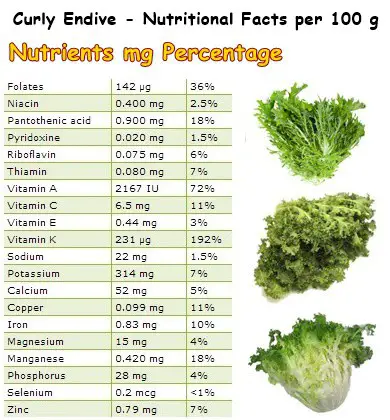The curly endive, also known as frisée (Cichorium endivia crispum) is a curly, crisp, green leafy vegetable related to chicory. In addition to making a great salad green, the curly endive is a rich source of important nutrients, namely vitamins A, K, B5 and B9, copper, iron, manganese, potassium and zinc. Despite being quite bitter, regular consumption contributes to lowering LDL cholesterol levels as well as high blood sugar levels.
The vegetable is low in calories, sugar and fat, offers great antioxidant protection and increases calcium absorption in bones, helping in the prevention of osteoporosis. It supports digestive system health, good vision and plays a crucial role in ensuring good immunity. Moreover, the curly endive is a great option for weight loss, constipation relief and helps in the prevention of neural tube defects in newborns thanks to its good folic acid content.

What is curly endive and what does it look like?
Curly endive is a green leafy vegetable with crisp, curly leaves of a bright green color and whitish stalk bottoms. It is related to chicory and called by the same name in some parts of the English-speaking world, hence the confusion as to what it is. However, curly endive is related to, but different from Belgian endives, radicchio or puntarelle, all three being different chicory varieties.
What does curly endive taste like?
Just as regular endives, curly endive is quite bitter, hence its lack of popularity among the general population. However, it makes a wonderful salad vegetable and a healthy addition to any diet.
How to reduce bitterness in curly endives
Blanch (or scald) curly endives.
Do this by throwing your endives in a pot of boiling water for a few seconds. Quickly take them out and place them under cold running water or put them in a bowl of iced water. This should help remove some of the bitterness, but may also contribute the leaves losing a part of their nutritional value (it is a well-known fact that heat destroys vitamins, especially vitamin C).
Add some lemon juice.
This is done to reduce bitterness. Alternatively, you can pair your endives with a lemon juice, vinegar and raw honey salad dressing. You can also pair endives with hard boiled eggs or sweeter vegetables such as potatoes. And when you eat, make sure you get a bit of endive with a bit of potato, egg or other salad ingredient to mask some of the bitterness. If you do decide to use honey, make sure you are not allergic first.
Don’t chew on them too much.
Overthinking can do more harm than good and so can chewing too much on a food we brand from the start as something we don’t like. I’m not saying to swallow a mouthful of curly endive without chewing to avoid tasting it, just don’t give the leaves time to fill your mouth with bitterness.

But why should we bother so much with curly endives? Are they really worth the time spent making them tasty? Yes, they are. Curly endives are genuinely nutritious, supplying our body with great amounts of essential nutrients which keep us in good health. Regular consumption may potentially help improve more serious medical conditions such as diabetes or high blood cholesterol. See below my list of 10 amazing nutrition facts and health benefits of curly endives.
What are the benefits of Curly Endive?
Promote weight loss
Curly endives contain only 17 kcal/100 g, 0.2% fat and 0.25% sugar, making them ideal if you wish to lose some weight. Pair them with a skinny salad dressing and you have yourselves a great side dish for a thin waistline.
Reduce blood cholesterol
Curly endives are a good source of dietary fiber (3.1 g) called inulin. According to research, inulin is quite efficient at reducing LDL (bad) cholesterol and triglyceride levels, contributing to artery and overall cardiovascular health.
Prevent arterial calcification and atherosclerosis
With 192% of the RDA of vitamin K, curly endives help prevent arterial calcification by ensuring the calcium we take in deposits correctly in bones (and teeth), not on artery walls or heart valves. The nutrient was found to regulate the way our body uses calcium which is why it is important to include vitamin K-rich foods in our diet. However, it is equally important to limit consumption if you are on anticoagulants because vitamin K supports blood coagulation and may encourage blood clot formation when intake is too high or when there is a predisposition towards clotting.

Contribute to strong, healthy bones
The high amounts of vitamin K in curly endives help regulate calcium metabolism by increasing calcium absorption in bones and teeth. This helps preserve bone integrity and bone health and significantly reduces osteoporosis risks.
Help stabilize blood glucose levels
Thanks to its inulin content, curly endives appear to help stabilize blood glucose levels, being recommended for both diabetics as well as for people suffering from intermittent hyperglycemia (high blood sugar levels), a pre-diabetic condition.
Support healthy gut flora
The inulin in curly endives is a great natural prebiotic, meaning it promotes healthy gut flora such as bifidobacteria. Good gut flora is essential for normal digestion and an overall good intestinal transit. The more fiber you eat, the faster your intestinal transit time is and the lower the risk for constipation.
Relieve constipation and promote colon health
Thanks to its good dietary fiber content, curly endives help relieve constipation. This, in turn, reduces the time our colon is exposed to toxins in bowel movements, thus contributing to colon health.
Stimulate immunity
Curly endives are an excellent source of vitamin A: 72% of the RDA. Vitamin A ensures the health of the mucous membranes at the level of the nose, mouth, throat, lungs and digestive tract, the parts of our body directly exposed to pathogens from the outside world, preventing any possible breach that may lead to infections and disease.
Help maintain good eyesight
Rich in vitamin A, curly endives are a great choice for maintaining good eyesight. A good dietary intake of vitamin A-rich foods efficiently prevents macular degeneration or loss of central vision.
Anti-inflammatory and antioxidant protection
The vitamins and minerals in curly endives boast great anti-inflammatory and antioxidant effects. For instance, vitamins A, C and K are highly efficient at reducing inflammation, a known cause of chronic disease. Copper, iron and manganese along with vitamin C are excellent antioxidants, protecting against oxidative stress, a buildup of cell and DNA damage that can potentially lead to cancer.
Interesting facts: Researchers are currently looking to developing a cure for prostate cancer based on high doses of both vitamin C (5.000 mg) and vitamin K3 (50 mg). Preliminary results show great promise, also suggesting that vitamins C and K may offer excellent prevention for this type of cancer.
Conclusion
As you can see from the nutrition table above, curly endives are quite the nutritious vegetable. They are great for children, adults as well as expecting mothers. Being rich in folate (vitamin B9), they help prevent severe spinal cord defects in newborns called neural tube defects. Moreover, curly endives favor digestive and cardiovascular health, help prevent osteoporosis and atherosclerosis and support the immune function.
